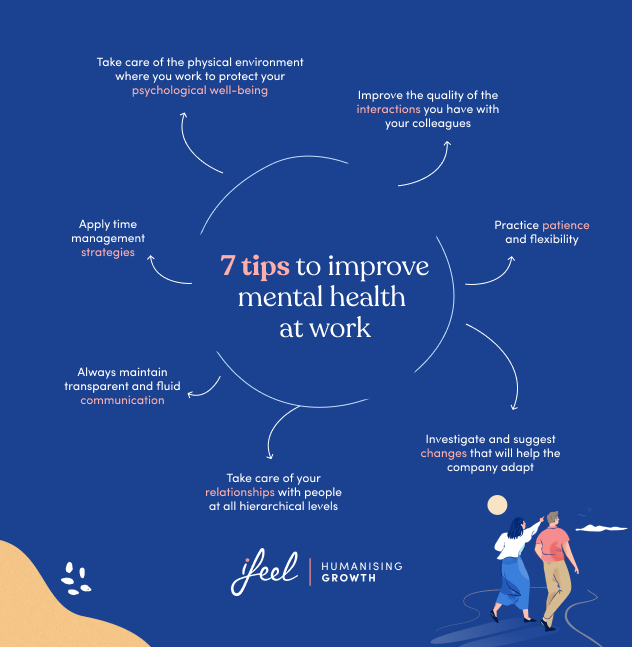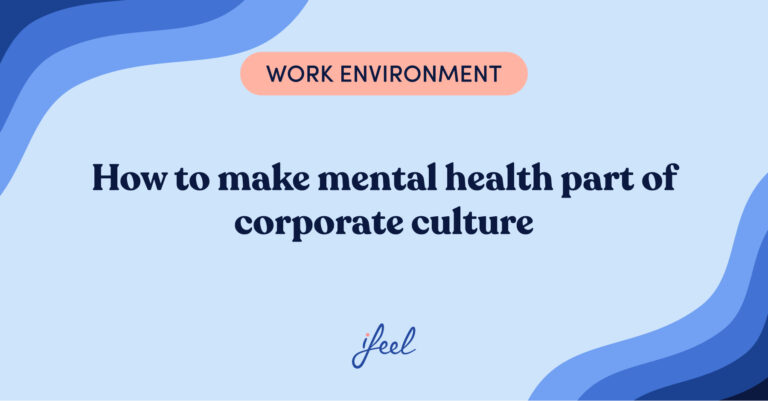5 Key Ways to Improve Mental Health at work
While companies’ don’t owe us our happiness, they should ensure they do not seriously damage our health. This includes mental health, a complex aspect of our lives with multiple factors which could make it deteriorate and, as such, there are multiple ways in which we can care for it.In this article we are going to talk about 5 important areas to consider, regardless of whether you hold a position of leadership or management or if you are an employee. Mental health in the workplace concerns us all: no ship can sale if the sailors don’t follow the guidance of the Captain.
Physical environment: Comfort, security, accessibility
A lovely, comfortable and well-equipped workplace is not a guarantee for success to achieve the best performance… it does appear that way. If we also bear in mind the relevance of the current Corona virus situation has in relation to safety, it is evident that the physical space in which we work every day greatly influences the health of employees, including mental health. The office, the studio, the kitchen or even the van, wherever we work every day must ideally be settings which make us want to go there, or at the very least, places where we don’t want to run away from.

Think about elements such as order, cleanliness, lighting, decoration and the arrangement of the furniture. They all subtly, yet undeniably, impact our mood and also in how easy it is to do our job or properly communicate. If this is your responsibility in your company, you must realise that your team also needs to perceive the workplace as a safe place against Corona Virus and know that your company actively is working to ensure it is safe.
Quality of Relationships
If your job was already isolated before, above all if before the pandemic you were already working from home, it is likely that the lock-down hasn’t significantly damaged your routine, like employees who are used to changing their workplace. In any case, a fundamental aspect to improving mental health at work is carefully maintaining the inter-personal relationships of the workforce.
Do you ever feel like the only good thing about your job is how well you get on with your colleagues and the good atmosphere you have? Or are you someone who feels that, regardless of how much you enjoy working where you work, you are extremely lucky to have a great time with your workmates? It goes without saying that the opposite can be psychologically devastating. It is enough if only one team member is a toxic or problematic person to make going to the office every day feel like torture.

A pleasant environment, clear information and good relations between colleagues are fundamental to supporting good mental health in the office.
Sometimes, we do not pay enough attention to improving good working relationships between workmates or we look the other way when there are issues which are turning the work day sour within the company. Work is work and we do not all need to be best friends, but we will certainly to be able to benefit from creating a good atmosphere for all and the connections of trust and mutual help which we are able to shape.
Capacity to Work Efficiently
Good will solves many issues, but if the internet doesn’t work or the video-conference is frozen, if I have to deal with my small child when I’m at work or if I don’t have access to certain materials because they are at the office, over time, these inconveniences can lead to burnout, without these issues being directly related with the work itself.It is true that good will solves many issues, but if the system of cross-over of coming and going from shifts becomes unworkable, if we have to be constantly watching what we touch or whose paths we cross, or if we have to wear a face mask for the entire day, it is highly unlikely that we will be working to our best ability.
Depending on nature of the work done and the characteristics of the workforce, it is not easy for all companies to organise the best ways of working during these current months and it is necessary for everyone to show a bit more patience and flexibility. If patience and flexibility are truly present across all levels of the organisation, not only in the lower levels, that being employees with less authority or responsibility, then is it much more likely that things will work better.
The perception that my needs are taken into consideration
The pandemic and its corresponding lock-downs and re-openings have turned the way that businesses work upside down. It has also brought to light their strengths and, why not mention it, various bad habits and inertia which have grown over the years, not always with a clear justification, but with a clear impact on the daily lives of employees.
Evidently, the work is what it is and, above all in very big companies or in those with limited resources, it is difficult to organise things in a way which suits everyone’s’ tastes without prejudicing the performance of the company. However, the good thing about when things are upside down and having experimented – albeit forcibly- is that new ways of working is what opens the door to incorporating more logical methods of working or, to say it in another way, that it is a logic which is more focused on the employee and not just the task at hand.
Transparency and Fluid Communication
When an employee knows what to expect, believes that there is someone sensible thinking about and making decisions, and is sincerely informed about issues pertaining to them, especially in relation to bad news or the absence of news, that is when anxiety levels tend to diminish. This means, in general terms and not when there are flagrant injustices, that the majority of people tend to demonstrate understanding in a great deal of situations when things are explained to them at an appropriate moment and in an effective way, or at the very least that this is what they perceive is happening. This, in short, is what we often call transparency and it is a magnificent tool to build ties of confidence between the employee and company.
Looking after mental health at work is the responsibility of everyone, as much management as employees.
For this reason, management and more junior employees should maintain a certain attitude of constructive optimism and maturity, and make an effort to mutually motivate each other, but this alone is not enough. Regardless of whether things are going well or bad, a satisfactory flow of information must continue, that there isn’t a sensation of “bad intentions” or “hidden agendas” and that, besides actively working for a grand purpose that we have the sensation that we are moving towards it.

These are just some of the points to take into consideration but certainly if you get thinking and speak with your workforce, even more points will come out. No workplace is perfect for good mental health, but it is not too difficult to take care of the basics to ensure an employee’s health does not suffer. If you need more advice on how best to organise your teams in the face of this new era, do not hesitate: work alongside a true professional, a specialist psychologist can help you in this.
Mental Health at Work: Challenges of the Covid Era
It is well known that health is more than the absence of illness: it is rather a state of optimal well-being, in a positive way, on a physical, psychological, social and even spiritual level.
As managers, chiefs or team leaders, we would do well to be concerned about the health of the people in our care. Their spiritual peace may not be in our hands, but we certainly do play an important role in their physical and, of course, psychological health. This state of well-being of these people, which is more than the absence of problems – at least those generated or aggravated by work – has to do with each individual separately, but also with the healthiness of their relationships at the interpersonal and group level.
Therefore, we speak of mental health in the corporate environment not as the absence of pathologies or dysfunctions that make it impossible for each worker to carry out the task at hand, but as a sufficient and significant state of well-being to which work contributes, instead of constituting a focus of problems that the individual has to strive to compensate for.
In the face of this reality, complex questions can arise once we become aware that as managers we have a role to play in the health of our workers, especially in an era characterized by the challenges faced by COVID-19. How do we measure the subjective well-being of our teams? What perception have our workers had of their well-being or not during confinement? What factors have generated deficits in their health? Do they have to do with the functioning of the company? Did they already exist before the pandemic and have we not yet corrected them?
What the company owes me
It is imperative that we correctly delineate the responsibility we have as a company for the subjective well-being of our employees. Even though we insist that we must be an active part in their well-being or, at least, not generate a negative effect on them while we work together – that is, not promote conditions that undermine their well-being – we must bear in mind that this does not mean that we have to take responsibility for their “happiness”. The happiness of our employees, whatever that means, is the responsibility of each one of them.
In this sense, it is of vital importance that each employee is also clear about the expectation that he or she places on his or her company with regard to enormously high goals such as so-called “happiness”.
Often, due to battered working relationships, dysfunctional corporate dynamics, broken trust and various frustrations, we misjudge what our company owes us and what it doesn’t for welfare purposes. Confusions aside, it is important to understand that the company does not owe us our happiness, or even an optimal state of self-fulfillment. The company is what it is, it produces what it produces and it dedicates itself to what it dedicates itself to, so if that does not make us happy or does not fulfill us as people, we know exactly where the door is.
However, what the company does owe us is loyalty, not exploitation, fairness in the distribution of profits and promotions, consistency between actions and words and restraint when making promises that cannot be kept. If this works well, perhaps we will not feel completely fulfilled (jobs are jobs, not paradises) but at least our work environment will be more reliable and this will have a positive impact on our subjective well-being.
The company is not responsible for the happiness of its employees but it is responsible for not generating conditions that worsen their health
Therefore, and returning to our role as employers, our responsibility is to promote healthy and honest working conditions: it is both morally just and economically efficient. This has to do with the physical environment we make available to the team (the spaces, the materials, the light and temperature conditions, the order and cleanliness) but also with what kind of horizontal and vertical relationships we promote and what type of psychological dynamics we deliberately or unconsciously promote when organizing work.
If we neglect this aspect, we will neglect the emotions that are generated in our companies. For example, economic pressure and voracity for tangible results achieved by the worker in favour of the company can lead to a highly toxic competitive environment. It is true that competitiveness can be motivating for some people but, in general, it tends to be very stressful, it does not encourage rapprochement between colleagues, it promotes high levels of frustration if not properly addressed and it encourages fear of not being seen as a valid or competent employee. It is our responsibility to decide if we want fear and voracity to be two of the main axes in our company.
The boss assumes, the leader asks
Making decisions quickly and exercising authority are essential in all management positions. On the other hand, it would be a mistake on our part to exercise authority by assuming which conditions generate discomfort or well-being in our employees, beyond some obvious issues.
Once we remember that in a real company authority is not distributed horizontally but is exercised from top to bottom, we can refine this indisputable reality by remembering that every leader is a boss but not every boss is a leader. After all, the boss who is a leader perceives what is good for his teams but does not take it for granted. The boss who only commands tends not to take into account what is good for the team, only for the company.
Likewise, it is also a mistake to assume that employees are satisfied or compensated with the compensation and benefits that the company makes available to them. These can be really useful and generous at times but employees might judge them as naive, counterproductive or distracting if they are not properly established. It is not always possible to design a compensation program that is meticulously tailored to the needs of each individual, but if we are ambitious we must remember a basic and easily understood principle: not everyone is equally rewarded. Not everyone wants more time, or more money, or more flexible hours.
Why not? Simply because not everyone needs the same thing. Some parents need childcare at the office while others prefer to be given time to take care of their children at home. Some will find it really practical to have a gym, hairdresser’s or supermarket integrated into the office while others need to clearly separate the environments in which they move. Some people are less financially secure at certain times and do not want a gift or days off but want pure cash, while others want time off to spend the money they already earn.
Are we that innovative and resourceful type of company or are we more conservative and reactive?
On the other hand, if some employees perceive that only some of them are compensated (e.g. “only those with dependent children will be able to telework” or “people without children are expected to be more flexible – i.e. generous – with their time than parents”) the atmosphere will become rarer. Compensations are great, but if they are not properly designed they can be perceived as simple stinginess or whimsy on the part of the company. If that happens, you’d better say goodbye to your team’s commitment to the company, because the last of the remaining staff just walked out the door.

Initiatives and challenges of the working environment
The idea of initiative refers to anticipating, being proactive, anticipating. Speed for speed’s sake doesn’t make any sense, but intuition and projection into the future are essential if our company is to survive. Are we the kind of company that has powerful and valuable initiatives, or are we rather conservative and reactive?
Neither of those two options is good or bad on its own, it depends. We have to evaluate risks, advantages, disadvantages, costs and all those elements that, no matter how much we try to control, can vary at any time and are therefore always at risk of escaping our calculation capacity.
If we take into account how many things have changed provisionally or definitively due to the health crisis in which we still find ourselves, the managers will have to decide what type of adaptation they want for their company from now on. Something palliative, that resembles as much as possible the old normal? Take advantage of it to significantly change the way we work? What importance do we give to presence or to our company having a powerful physical space?
Differentiating what is good for the company (economic factor) and what is good for the employees (human factor) ends up being traditionally a minefield in which it rarely rains to everyone’s satisfaction. If the effort is to be made to detect mines and hopefully deactivate them, the question that needs to be answered is whether the staff will be included in the decision-making processes, even if it is at a consulting level, or whether, on the contrary, everything that is done for the people will be done without the people. This is what shapes much of our business culture and what makes the difference between leading and commanding, between taking people into account and saying that people are taken into account.
Throughout this decision-making process, it is essential to manage different types of flexibility, i.e. different levels of concessions that we can/want to make as a company. Moreover, the different decisions to be taken cannot always be structured in a serial way, so that one follows the other, but rather as a more or less complex constellation in which all decisions influence each other. This is why we must consider the idea that perhaps the only important decision ahead of us is not how we are going to manage telework in the short, medium and long term. That is probably the most pressing decision, but the question is to what extent we want or can be satisfied with that objective alone.
A matter of trust
When we want to talk about psychological health in the corporate environment then we have to mention relationship health. One of the main channels that convey this health is trust: not only between peers, but also between different hierarchical levels.
Trust is gained through coherence, that is, through the consistency between what is said and what is done and also through the correspondence between the different things that are said. We often fall into the cliché that trust takes a long time to establish and very little time to fade away. This is not true. Trust takes time to establish basically if someone is very suspicious, or if someone is untrustworthy, but under normal conditions it is built up almost instantaneously. In fact, if human beings were not quick, even very quick, to trust, life in society would not be possible. All our daily life is a succession of acts of faith, aimed at survival and also at cushioning the fear that the other might be a threat to our survival rather than an ally.
On the other hand, to think that trust is so easily broken does not fit well with all those life situations in which we give second and third chances, those situations in which we forgive or, simply, those situations in which we continue to let ourselves be “fooled”.
Trust, then, can be won and lost, and won and lost again, depending on many factors, ranging from the severity of what happened to how much we want to “keep trusting” the other. As in any type of relationship, within the corporate environment the perception of incoherence generates insecurity (the other person is not reliable) and uncertainty (I don’t know what to expect from the other person). In other words, attitudes that do not foster trust generate discomfort and destroy commitment. And if there is no commitment, an employee’s performance may be correct, but it will never be optimal: it will not go beyond that, because the uncommitted employee just covers the file but does not invest extra resources in his company, does not bet on it, does not give things away.

Teleworking world
If during the months of the pandemic there is something that has had an impact on the channels through which the wellness of relationships circulates in the company, it is teleworking. Overnight, the physical company, the media, and the methods of monitoring and reporting between workers and coordinators have been altered. Overnight, home-based working has revealed the extent to which trust relationships and team integration were healthy, or whether they were so fragile that they flew out as soon as physical presence was disrupted.
This way of working has important repercussions on people’s health. Working from home is often thought of as a comfortable and advantageous scenario, which makes everything agile and allows people to have more time and even to have more time available.
However, whether this happens depends on many factors: how much space a person is able to set up at home, how well their internet connection works and how skilled the teams are at coordinating without being physically together. Not to mention whether the person lives alone or not, whether they have children at home to look after or how they cope with working “alone” from home.
Thus, even taking into account the enormous advantages that teleworking can have for some people in some circumstances, it can also be a source of psychological distress if it leads to some of these situations: isolation, perceived loss of control over work and personal activities, disruption of schedules leading to inefficiency or excessive hours, the perception that work physically and symbolically invades all other facets of life, or overexposure to computers, mobile phones and other devices.
These harmful consequences of teleworking can be alleviated to some extent but it is not possible to do so if they are not detected or if they are detected but not admitted. In this case, the worker will perceive that he or she has been the big loser of the new work organisation during the confinement and will continue to be so now that we are moving towards some kind – still to be defined – of post-confinement normality.Teleworking can be a great advantage or the source of great unrest if it is not well organised
As managers of our teams, we must reflect on what remote working was in our company before the pandemic, what it has been during the pandemic and what we want it to be from now on. In addition to relationships of trust, this has important implications for the idea of conciliation, which is older – and still in the process of being well resolved – than that of telework.
Deciding what we’re going to reconcile
Teleworking has always been and will always be a conciliation measure, that does not change because of a pandemic. What has changed over time are the things that have been attempted to reconcile. Before confinement, what was reconciled were usually isolated contingencies with the execution of tasks: own illness and that of the children, false holidays or days off, experiments with working from home if the weather was bad or one was on a business trip, etc. During confinement, the survival of the company has been reconciled with the health of the workers (and, basically, with compliance with the law). The question is: what exactly are we going to reconcile from now on?
Over time, the term “conciliation” has become the shortened euphemism for basically allowing people with children to harmonize their responsibilities as parents with their responsibilities as workers. People without children, and even more so people without children and without a known partner, tend to be the forgotten ones in this scheme -their absence of family responsibilities means that they have to be more available- and this generates resentments when it comes to perceiving the benefits and the measures of conciliation.
If we really want to keep pace with the time we have to live with, which in some respects has nothing to do with the time we had until a few weeks ago, then we must ask ourselves: will our company from now on move forward in the process of better adjusting to the needs of its various workers, or will it continue to consider that there are first-rate free times and second-rate free times and that only the former should be protected?
However, complaints from many workers about their ability to organise schedules and tasks, or about the company’s ability to respect schedules during confinement, have been repeated from different sectors. Before the pandemic this was already important, during confinement it has been a challenge for many teams, and, right now, it should be an unavoidable initiative in any company: to improve the organization of time once and for all. Set schedules so that people do not work more hours than they should but rather that efficiency is enhanced. Banning eating in front of the computer. Optimize time (do not take breaks of one or two hours to eat if it is not essential), communicate as far in advance as possible the shifts in case of rotating work, etc. People are not asking for the moon, they are asking to work in normal conditions.

Culture and results of the organization
The culture of our organization is that backdrop where we try to clarify the philosophical foundations of our work. It is an identity cluster which, by its very nature, has a fixed part and a part in constant transformation. It is like people who, to a certain extent, always know who we are, while we are always redesigning, deciding and finding out who we are.
So, if we want the health emergency of COVID-19 to have passed through our company instead of settling for our company having gone through it, we will have to return to the backdrop and review the different parts of our corporate identity.
Values and mission
Knowing them helps to clarify the needs of our company and, therefore, indicates a possible route for our teams. There has to be coherence between the values (what is important to us), the mission (what our company exists for in the world) and the actions that are carried out supposedly derived from it. For example, I can’t say that the most important thing for the company is the people if I then beat them up or don’t listen to them. This generates distrust and is not good for the psychological and physical well-being of the employees. And, of course, it is not good for the external image of the company if its internal image (the one its employees have of it) is bad.
Needs
As managers, directors or coordinators, we must reflect on what the company needs at this particular time, in an unprejudiced and flexible manner. We will then decide how to formulate those needs in terms of objectives, challenges and expectations. In other words, how we will make them operational. But always calling things by their name: corporate talk generates distrust, honesty provides security.
Time
We must allow time for the needs to emerge and be clear and also for the actions we implement to have an effect. If we change something, we must ensure that we have effective indicators to measure the impact of those measures, always with a short, medium and long term forecast.
Once the transformation measures have been implemented and their results have become solid, we can incorporate this process not only into the company’s profit and loss account but also into its brand, as it will be a sign of its versatility and capacity to adapt as well as an indicator of the aspects to which it attaches importance, of how it manages its resources. Without going any further, an indicator of how the company takes care of its human resources, that is, its workers, who are the main tool for achieving the objectives.
Transparency
It has to be real and refer to what is being done and why it is being done, what will be done in the future and why it will be done, what is being considered for implementation and even what is not yet known. When we talk about real transparency we mean significant transparency: not to transmit superficial or irrelevant information to the staff so that they have a false perception of participation or power (information is power), but to allow a flow of useful and quality information about what affects them. In other words, not to cheat with transparency, that is, not to transmit false transparency that in reality is opacity. I cannot say that in my company the most important thing is the people if I then beat them up or do not listen to them
In short, employees and employers face tensions between a business culture that has not yet killed off some of its traditional aspects that no longer serve it (hypocrisy, voracity, rigidity, absenteeism) and a business culture that wants to take advantage of the COVID-19 era to accelerate the necessary establishment of better aspects (flexibility, health care, honesty, efficiency). Unfortunately, the rules of money are what they are and this will allow old vices to survive for a while yet. In the meantime, each company will have to consider to which force vector it wants to contribute with its practices and not only with its speech. The most important part of its health – the physical and psychological health of its workers – is what is at stake in this decision.
How can we take care of our mental health at work?
Do we think enough about how can you take care of our mental health at work?
If we had a physical health problem, we would never hesitate to ask our managers for a few days off, but when the problem is not recognizable to the eye, it’s a bit harder to talk about. There is still a certain stigma surrounding mental health, and trying to battle that stigma along with our own internal struggles is not easy. Take a look at some of our suggestions to help you cope.

What can we do as employees to take care of our mental health at work?
Try and focus on your feelings and symptoms. A feeling of frequent apathy, without motivation, is a symptom that something is not going well. It’s also important to know that our internal struggles often manifest themselves through physical symptoms such as muscle aches, headaches, and problems getting sleep.
Talk about it. It might feel scary to open up about what is happening to you, but talking about it with your co-workers, friends, and family is a small action that helps lift the weight off your shoulders.
Ask for help and don’t ignore what you’re going through. It’s important to be able to go to a psychologist who will guide us through our own healing process just like a doctor does when we have a physical problem.
What can we do as family or friends?
When someone close to us is going through a difficult time, we need to be selective with our language and we need to avoid giving advice that is not sought after. In these situations, the best thing to do is show compassion and genuine interest in the person’s needs so we can figure out how to support them further.
And finally, what can we do as bosses?
Foster a good work environment
Social support is one of the most important and protective factors for our health, both physical and emotional. Therefore, promoting teamwork and social relationships within our work environment is essential to take care of our mental health at work.
Break the stigma
We shouldn’t have to wait for someone to struggle with mental health to address it. We can take the initiative ourselves and ask our workers how they are holding up and encourage them to voice any concerns.
In short, encourage acceptance
When we accept the idea that mental health is just as important as physical health, we will achieve peace of mind, productivity, a better mood…and we will be happier employees overall.
Whether they are in charge of HR department or they have a higher position, those responsible for human capital management in organizations are not alone when it comes to take care of our mental health at work. Instead, they can rely on health professional knowledge such as the emotional well-being program for companies that ifeel offers to its partners. This program has been designed by a large team of psychologists who are experts in occupational mental health and is based on two lines of action. If you want to know more about this program, just take a look at our website.
The first line is aimed at providing continuous and personalized advice to HR department managers, providing them with the necessary tools to assess, prevent and address all psychosocial risk factors that may jeopardize the psychological well-being of workers.
The second line of action of ifeel‘s emotional well-being program for companies is aimed at the entire workforce as a whole. Employees can download ifeel‘s app, free of charge, and access the different mental health care resources designed by our team of psychologists. These resources are organized at different levels, depending on the needs of each employee. Of course, they include the possibility of starting online therapy with one of our therapists if necessary, leading to improved mental health.
Contact us today and find out how you and everyone in your company can benefit from ifeel‘s emotional well-being program for companies.










